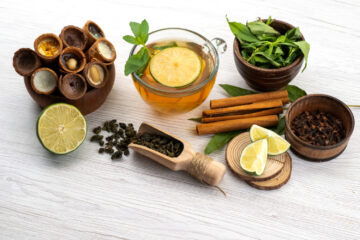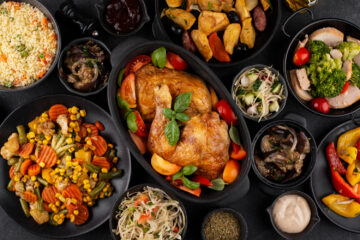Top 10 High-Risk Foods That Can Trigger Food Poisoning

Foodborne illnesses or food poisoning can be a rather unpleasant experience, characterized by symptoms such as vomiting, diarrhea, stomach cramps, and in severe cases, fever, and chills. This can result from eating food that is contaminated with harmful bacteria, parasites, viruses, or toxins. It’s important to note that while almost any food can theoretically cause food poisoning if it’s improperly handled or prepared, there are certain foods that are particularly high risk.
Here are ten types of foods that have a higher risk of causing food poisoning when not handled or prepared properly.
- Raw or undercooked meat and poultry: Raw and undercooked meat, especially poultry like chicken and turkey, can harbor dangerous bacteria like Salmonella and Campylobacter. Undercooking or cross-contamination (for example, using the same cutting board for raw and cooked meats) can lead to these bacteria being ingested, which can result in food poisoning.
- Raw or undercooked seafood: Seafood, particularly shellfish like oysters and clams, can be a source of foodborne illnesses. They can contain harmful bacteria and viruses, notably Vibrio vulnificus, which thrives in warm seawater. Sushi and sashimi also pose risks, as raw fish can carry parasites.
- Raw eggs: Eggs are a common source of Salmonella, which can contaminate the eggshell or even reside inside the egg. Foods that contain raw eggs, like homemade mayonnaise, some salad dressings, cookie dough, and cake batter, can pose a risk if the eggs are contaminated.
- Unpasteurized dairy products: Unpasteurized milk and cheese can carry harmful bacteria like E. coli, Salmonella, and Listeria. Pasteurization is a heat treatment process that kills these bacteria, and consuming only pasteurized dairy products can significantly reduce your risk of foodborne illness.
- Fresh fruits and vegetables: While they’re vital for a healthy diet, fresh produce can also be a source of food poisoning. They can be contaminated with harmful bacteria like E. coli or Salmonella during growth, harvest, or preparation. Washing produce thoroughly and peeling it when possible can reduce, but not eliminate, the risk.
- Sprouts: Sprouts like alfalfa, radish, and mung bean can harbor harmful bacteria, notably E. coli and Salmonella. The conditions under which sprouts are typically grown (warm and moist) are ideal for bacteria growth. Cooking sprouts thoroughly can reduce this risk.
- Processed foods with long shelf life: Foods like hot dogs, deli meats, and pâté are often associated with Listeria, a bacteria that can survive refrigeration and even freezing. Pregnant women, elderly people, newborns, and people with weakened immune systems are particularly susceptible to Listeriosis.
- Uncooked flour: While it’s not typically associated with foodborne illnesses, raw flour can harbor E. coli. This means that cookie dough or cake batter containing raw flour can pose a risk. Cooking and baking effectively kill the bacteria, making the finished product safe to eat.
- Pre-packaged salads: Packaged salads, including lettuce and spinach, can be contaminated with E. coli, Salmonella, and Listeria. Contamination can occur at various stages, including during growing, harvesting, processing, or packaging.
- Fermented or pickled foods: While fermentation and pickling can be safe when done correctly, they can also create an environment where harmful bacteria like Clostridium botulinum can grow if done improperly. This bacteria produces a toxin that can cause botulism, a potentially fatal illness.
The foods listed above are not inherently dangerous, but they do require careful handling and preparation to ensure they are safe to eat. Always cook meat, poultry, seafood, and eggs to the appropriate temperatures, wash fruits and vegetables thoroughly, and pay attention to the storage and handling instructions on pre-packaged foods. Avoid cross-contamination by using separate utensils and cutting boards for raw and cooked foods, and promptly refrigerate leftovers. With these precautions, you can greatly reduce your risk of food poisoning.



















